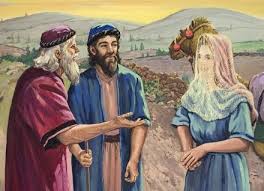L. It is her. I know it is her. She is to be God’s blessing to me. But what of this mystery (a sadder eyes)? How could it not be her; what can it mean?
Psalm 116
10 I believed, even when I spoke:
“I am greatly afflicted”;
11 I said in my alarm,
“All mankind are liars.”
12 What shall I render to the Lord
for all his benefits to me?
13 I will lift up the cup of salvation
and call on the name of the Lord,
14 I will pay my vows to the Lord
in the presence of all his people.
Genesis 28:20-22 Then Jacob made a vow, saying, “If God will be with me and will keep me in this way that I go, and will give me bread to eat and clothing to wear, so that I come again to my father’s house in peace, then the LORD shall be my God, and this stone, which I have set up for a pillar, shall be God’s house. And of all that you give me I will give a full tenth to you.”
First, a riddle, then a Psalm; then, a vow of Jacob at Bethel. What does this have to do with marriage?
See the relationship of truth to vows and covenant and worship and yes, the importance of truth in marriage: a lesson Jacob had to learn as consequence of sin and consequence of deceit. Let’s begin with his blessing by his father, prior to his marriage:
Genesis 27:22 So Jacob went near to Isaac his father, who felt him and said, “The voice is Jacob’s voice, but the hands are the hands of Esau.” …
29b Be lord over your brothers,
and may your mother’s sons bow down to you.
Cursed be everyone who curses you,
and blessed be everyone who blesses you!”
Rebekah deceived her husband; Jacob deceived his father Isaac.
42 But the words of Esau her older son were told to Rebekah. So she sent and called Jacob her younger son and said to him, “Behold, your brother Esau comforts himself about you by planning to kill you. Now therefore, my son, obey my voice. Arise, flee to Laban my brother in Haran…
Jacob flees to live under the protection of Laban, his mother’s brother, rather than risk his life in the lands of his father. Isaac confirms it.
Genesis 29
10 Now as soon as Jacob saw Rachel the daughter of Laban his mother’s brother, and the sheep of Laban his mother’s brother, Jacob came near and rolled the stone from the well’s mouth and watered the flock of Laban his mother’s brother. 11 Then Jacob kissed Rachel and wept aloud. 12 And Jacob told Rachel that he was her father’s kinsman, and that he was Rebekah’s son, and she ran and told her father.
13 As soon as Laban heard the news about Jacob, his sister’s son, he ran to meet him and embraced him and kissed him and brought him to his house. Jacob told Laban all these things, 14 and Laban said to him, “Surely you are my bone and my flesh!” And he stayed with him a month.
This relationship ‘Surely you are my bone and my flesh’ should sound familiar (even familial): a closeness of husband and wife, a closeness of sister and brother, a closeness of relatives – different, each; but all important relationships.
Now deceit enters once more into the picture:
15 Then Laban said to Jacob, “Because you are my kinsman, should you therefore serve me for nothing? Tell me, what shall your wages be?” 16 Now Laban had two daughters. The name of the older was Leah, and the name of the younger was Rachel.
17 Leah’s eyes were weak, but Rachel was beautiful in form and appearance.
18 Jacob loved Rachel. And he said, “I will serve you seven years for your younger daughter Rachel.”
A bargain for love (not arranged by the fathers). A romantic picture… then they should ‘live happily ever after;’ that is, except for sin and lies and deceit.
Imagine this romantic picture. Jacob has worked for his soon-to-be father-in-law for seven years and not had sexual relations with Rachel, whom he loved. A wedding feast; and then…
21 Then Jacob said to Laban, “Give me my wife that I may go in to her, for my time is completed.” 22 So Laban gathered together all the people of the place and made a feast. 23 But in the evening he took his daughter Leah and brought her to Jacob, and he went in to her.
Deceit! Betrayal! As Jacob had lied and betrayed his own father’s trust to receive his blessing.
Now what? Laban scrambles to make amends and keep the peace. He provides for both daughters and his new son-in-law, married to Leah; and, oh, by the way… if you will work for me another seven years, I will give you Rachel.
Agreed. Now Jacob has two wives! But just like his Grandfather Abraham, he will reap the double blessings and increased difficulties of marriage even more-so. (We won’t go into that here.)
First, God will bring Jacob back to truth, before confirming with him covenant.
Genesis 31: Now Jacob heard that the sons of Laban were saying, “Jacob has taken all that was our father’s, and from what was our father’s he has gained all this wealth.” 2 And Jacob saw that Laban did not regard him with favor as before. 3 Then the Lord said to Jacob, “Return to the land of your fathers and to your kindred, and I will be with you.”
Jacob flees Laban with his wives, children, herds and possessions. Laban pursues and catches up. They make a truce.
48 Laban said, “This heap is a witness between you and me today.” Therefore he named it Galeed, 49 and Mizpah, for he said, “The Lord watch between you and me, when we are out of one another’s sight. 50 If you oppress my daughters, or if you take wives besides my daughters, although no one is with us, see, God is witness between you and me.”
They become two families at peace, though separated by distance and a border. The wife given by the father to her husband… both wives to their one husband, Jacob; and the servant wives as well (another story) and all the grandchildren.
Jacob has become a sojourner once more (as was his grandfather, Abraham).
Genesis 32 Jacob went on his way, and the angels of God met him. 2 And when Jacob saw them he said, “This is God’s camp!” So he called the name of that place Mahanaim…
Finally, after all these years… after all these lies and consequences of lies: humility, obedience and a confession of repentance of sin before God:
9 And Jacob said, “O God of my father Abraham and God of my father Isaac, O Lord who said to me, ‘Return to your country and to your kindred, that I may do you good,’ 10 I am not worthy of the least of all the deeds of steadfast love and all the faithfulness that you have shown to your servant, for with only my staff I crossed this Jordan…
22 The same night he arose and took his two wives, his two female servants, and his eleven children, and crossed the ford of the Jabbok. 23 He took them and sent them across the stream, and everything else that he had.
24 And Jacob was left alone. And a man wrestled with him until the breaking of the day…
27 And he said to him, “What is your name?”
Jacob had clung to Esau’s heal at birth. Jacob had bought Esau’s blessing and fought to keep it by his lie to his father; for when Isaac asked his name, Jacob had replied with a lie: “Esau.” He now wrestles with the Lord.
But Jacob said, “I will not let you go unless you bless me.”
And he said, “Jacob.” 28 Then he said, “Your name shall no longer be called Jacob, but Israel, for you have striven with God and with men, and have prevailed.”
Do you believe that you can prevail against God, unless it is God’s will?
We must be humble to become god-like. We must confess truth to reap truth. We must honor our word.
Israel: God prevails.
God IS part of a godly marriage and a covenant of promise.
Relationship requires truth. God knows truth.
- Is your relationship with God honest?
- Is your relationship with the husband (wife) of your vows honest?
- Is your relationship with Christ Jesus honest?
Is our witness of Christian marriage truthful when Christ asks:
What is your name?
Next: A confession



